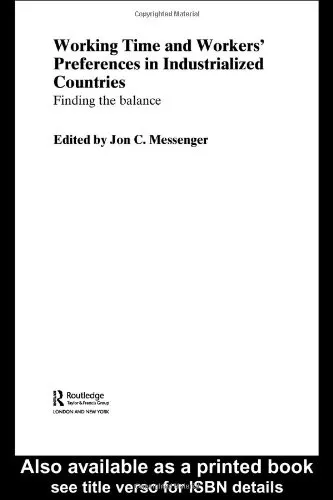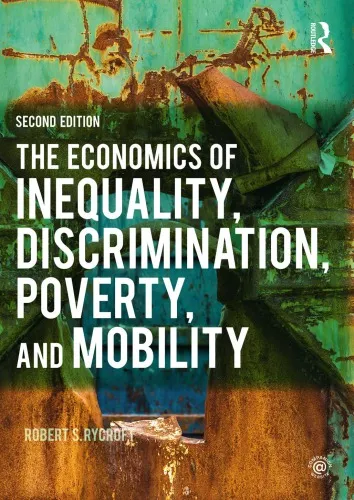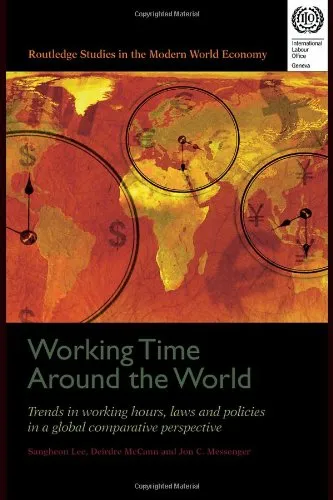Working Time and Workers' Preferences in Industrialized Countries: Finding the Balance
4.9
Reviews from our users

You Can Ask your questions from this book's AI after Login
Each download or ask from book AI costs 2 points. To earn more free points, please visit the Points Guide Page and complete some valuable actions.Related Refrences:
Introduction to "Working Time and Workers' Preferences in Industrialized Countries: Finding the Balance"
"Working Time and Workers' Preferences in Industrialized Countries: Finding the Balance" is a thought-provoking exploration into the dynamics of working hours, employee preferences, and the broader socio-economic implications of how we spend our time at work. Written by Jon C. Messenger, this book is a deep dive into the challenges and opportunities of balancing productivity with personal and family life—offering insights that remain highly relevant for modern labor markets across industrialized nations.
In an era of rapid globalization, technological advancements, and shifting societal expectations, this book investigates how working time arrangements impact workers' satisfaction, organizational efficiency, and societal progress. Each chapter offers a rich blend of academic research, real-world case studies, and policy proposals to address the evolving needs of the labor force while maintaining economic stability.
Detailed Summary of the Book
This book focuses on the complexities surrounding working time in industrialized countries. It delves into the historical evolution of work hours, the forces shaping current work-time arrangements, and the policies countries have adopted to balance individuals' desires against organizational goals.
Chapters explore key themes such as the rise of flexible work schedules, the decline in traditional "9-to-5" structures, and the emerging trend toward shorter workweeks. Messenger examines the psychology behind workers' preferences for certain schedules, analyzing how factors like age, gender, geographic location, and economic status influence perceptions of ideal work patterns.
The book also addresses the implications of overwork and underwork on productivity and health, taking a holistic view of the cost of imbalance. Key policy mechanisms—such as laws governing overtime, public campaigns for work-life balance, and how businesses can adapt to shifting worker expectations—are explored in depth.
Key Takeaways
Here are the core insights readers can expect from the book:
- The need for customized working time arrangements to meet diverse worker needs while maintaining economic efficiency.
- The importance of aligning employee satisfaction with organizational success to achieve sustainable productivity.
- How national policies can foster work-life balance, improve mental health, and enhance workforce engagement.
- Broader societal benefits of overhauling archaic working time norms to align with modern life.
Famous Quotes from the Book
Here are some memorable quotes from "Working Time and Workers' Preferences in Industrialized Countries: Finding the Balance":
"The hours we spend working are not just a reflection of productivity—they’re a mirror of our values, priorities, and the quality of life we aspire to achieve."
"Balancing work and life is not an individual challenge, but a collective societal project that demands bold policies and innovative thinking."
"Workers are not machines, and productivity must be measured against humanity’s broader aspirations—in fulfillment, health, and connection."
Why This Book Matters
"Working Time and Workers' Preferences in Industrialized Countries: Finding the Balance" is more than just a book on labor practices—it is a clarion call for a better future where productivity is harmonized with workers' needs at economic, personal, and societal levels.
In a world where burnout is becoming an epidemic and work-life balance feels elusive, this book provides actionable strategies and policy insights to address these concerns. It challenges conventional wisdom and invites readers to rethink how work schedules can be structured to promote equity, efficiency, and well-being. Whether you are a policy-maker, business leader, or conscientious worker, the principles outlined in this book are essential for fostering a sustainable and fulfilling work environment in the 21st century.
Messenger’s meticulous research and compelling arguments have established this work as a cornerstone in the dialogue about labor, productivity, and human happiness. It serves as an invaluable resource for anyone committed to designing work environments that respect personal agency while driving collective success.
Free Direct Download
You Can Download this book after Login
Accessing books through legal platforms and public libraries not only supports the rights of authors and publishers but also contributes to the sustainability of reading culture. Before downloading, please take a moment to consider these options.
Find this book on other platforms:
WorldCat helps you find books in libraries worldwide.
See ratings, reviews, and discussions on Goodreads.
Find and buy rare or used books on AbeBooks.
1089
بازدید4.9
امتیاز0
نظر98%
رضایتReviews:
4.9
Based on 0 users review
Questions & Answers
Ask questions about this book or help others by answering
No questions yet. Be the first to ask!














